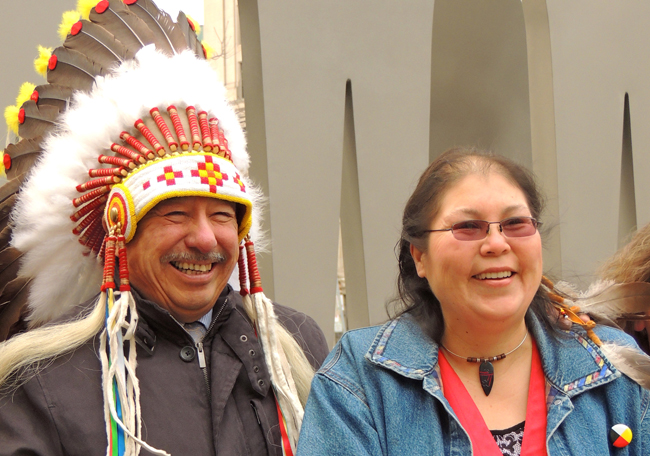Still no decision on Sixties Scoop class action lawsuit

By Christine Smith (McFarlane)
TORONTO – Ontario Regional Chief Stan Beardy invited all Indigenous leadership and citizens to stand with Sixties Scoop survivor Chief Marcia Brown-Martel to demand justice from the Crown for their inaction in protecting the Indigenous cultural identity of thousands of Indigenous children.
The Ontario Divisional Court heard Canada’s appeal of the September 27, 2013 decision of Justice Edward Belobaba. In this case, two judges of the Ontario Superior Court have approved the action as a class proceeding so that the interests of 16,000 Aboriginal children – who lost their culture and identity – are not forgotten.
“Every time we go into court, it’s always difficult because it’s the very lives of our children from our past and current days,” said Chief Brown-Martel of Beaverhouse First Nation. “It’s hard, but if the outcome of today’s proceedings are negative, we’ll still push forward even if it’s from a different path.”
Both judges dismissed Canada’s request of the Court to throw the case out as not disclosing any reasonable cause of action. On Nov. 14, the Crown argued in reference to adoption and care that “generic rules apply to everyone, not only Aboriginal peoples, though a fiduciary duty exists between the Crown and Aboriginal people.” It was also said that the terms of a class action means “the personal well being of a collective of people and that this particular case is an individual matter, not a collective one, and this is a case that should not go to trial.”
Chief Brown-Martel, along with fellow survivor Robert Commanda, launched an unprecedented class action lawsuit against in 2009 and was certified in 2010 for claims of negligence and breach of fiduciary duty by the federal government.
Between 1965 and 1984, more than 16,000 children in Ontario were stripped of their Indigenous cultural identity in Ontario because Canada scooped them from their families and communities and placed them in non-Indigenous homes. This practice, which has become known as the Sixties Scoop also resulted in these children losing their cultural identities, being separated from their natural families, losing access to their medical histories and placed obstacles to their reclaiming Aboriginal rights and status.
This practice only ended in 1984 after Ontario First Nations Chiefs passed resolutions against it, and a Manitoba judicial inquiry released Report of the Review Committee on Indian and Métis Adoptions and Placements which harshly condemned it.
The outcome of this case has the potential to inform other child welfare cases currently before the courts, such as the First Nations Child & Family Caring Society and Pikwakanagan cases and today the judges reserved judgment once more.


